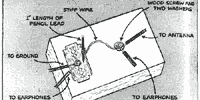Radio Link for WWII Prisoners in Japan

 3:39
Jeff Rice
3:39
Jeff Rice
POW’s construct a makeshift a radio.
Broadcast: May 6 2005 on NPR Day to Day Subjects: War, International, Technology
Analysis: Sixtieth anniversary of Germany's surrender in the Second World War
May 6, 2005 from Day to Day
ALEX CHADWICK, host: Sunday is the 60th anniversary of V-E Day.
(Soundbite of vintage newscast)
Mr. WINSTON CHURCHILL: At 2:41 AM, the representative of the German high command signed the act of unconditional surrender to the Allied expeditionary force.
CHADWICK: That's Winston Churchill announcing the Allied victory in Europe. Many people heard that news sitting in their living rooms listening to the radio. But a group of British soldiers held in a Japanese POW camp--they were listening, too, on a little radio receiver they had hidden in the camp latrine. They'd built this radio receiver out of tin foil, scrounged wires, string, even tree bark. The person behind the brilliant, improbable design was R.G. Wells, a quiet, low-key radio engineer who'd been stuck in the camp since 1942. In this archive tape, Colonel Wells describes how he did it.
(Soundbite of vintage interview)
Colonel R.G. WELLS (Former POW): I hit upon the idea of taking some tin foil or aluminum foil. We used a piece of string, tree wood and the sort of bark--take the pitch black apart and put pitch black on the row and (unintelligible) from palm oil. And we put the palm oil along the wire and stretched out the--rubbed this palm oil out, thickening it with a little bit of flour. The flour sort of bound the palm oil together and it formed a fairly good insulation over the wire. We had a piece of ...(unintelligible) type wood. So we'd been ...(unintelligible) by holding a little stick across it and ...(unintelligible) over one's head and eyes looking out for the possible interruption by the Japanese. Despite the intrepidation, we heard Big Ben chiming.
(Soundbite of vintage newscast, beginning with chimes)
Mr. THOMAS CADET: L BBC, this is Thomas Cadet, reporting from Supreme Headquarters.
Col. WELLS: And it was the BBC ...(unintelligible) quite a clear signal.
Unidentified Man: This is the BBC Home Service.
Col. WELLS: That kid was somebody talking about growing hops in Kent, and this broadcast went on for something like three-quarters of an hour without interruption, and ultimately, the signal faded out, and I was very annoyed and was asked in the next morning by my senior officer what was the news, and I said, `We've got good news and I can't talk now. Something (unintelligible) come this way,' so he came along and he said, `Now what's this news you're talking about?' I said, `Well, I didn't actually hear any news,' and he looked--became very annoyed and said, `What the hell does that mean?' and I said, `If--they're British primary producing experts and they're capable and able to spare the time to talk about growing hops in Kent, Britain must still be alive and fighting with their thumbs up, and as far as I'm concerned, that's the best news I could hear.'
(Soundbite of music and Morse code)
CHADWICK: As time went on, R.G. Wells and the other soldiers would hear actual news reports of Allied victories in the Pacific and eventually of the defeat of Japan.
(Soundbite of vintage music programming; segment credits)
CHADWICK: DAY TO DAY is a production of NPR News and slate.com. Join us again next week. I'm Alex Chadwick.

